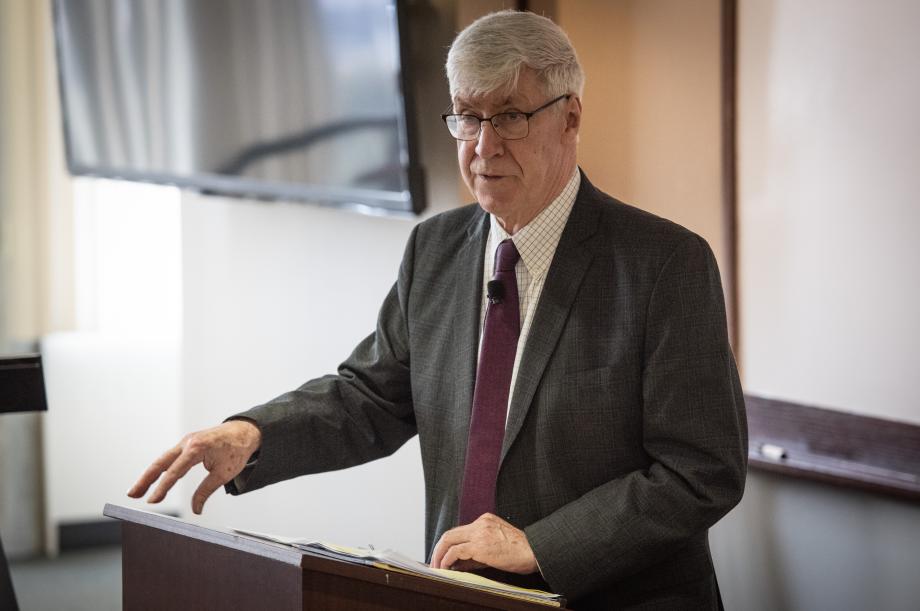Professor Jeremy Waldron Presents 2024 Dewey Lecture, “Dignity and the Trajectory of a Human Life”

Should the desires of children be always set aside based upon what is perceived to be in the interests of their future adult selves? Should the healthcare wishes of a happy, but mentally declining octogenarian be taken into account when they are different from those expressed by their 50-year-old self at the height of their abilities?
These are just a couple of the thorny questions raised by Law Professor and Philosopher Jeremy Waldron during the 2024 Dewey Lecture in Law and Philosophy. The hour-long lecture, “Dignity and the Trajectory of a Human Life,” delved into the relationship between human dignity in general and the dignity properly accorded to individuals at various points in their life cycle, from infancy through extreme old age.
“Any philosophical account of human dignity has to come to terms with this point that human lives are led along a trajectory,” said Waldron, who teaches at New York University School of Law and is affiliated with NYU’s Department of Philosophy. “When we value human lives, I think we have to value the whole of the trajectory.”
The Dewey Lecture was established in 1981 with an endowment from the John Dewey Foundation. The lecture was named after the premier American philosopher and educator “to honor a social philosopher so intimately connected with the history of the University.”
In his welcoming remarks, Dean Thomas J. Miles noted, “The Dewey Lecture highlights and reaffirms our commitment to the importance of interdisciplinarity in the study of the law.”
“A Work in Progress”
Waldron began his lecture by observing that the concept of human dignity and what it means is a “work in progress.” While human dignity “is supposed to apply without discrimination to all human individuals, humans come in all shapes and sizes. Human dignity is puzzling because we have not quite made sense of its application to beings.”
Looking around at the predominantly student audience, Waldron observed that individuals at the very starting stages of their career were disproportionately represented in the room. And, while a quarter of the world’s demographic is under the age of 15, not a single such person was in attendance, he pointed out. Likewise, he added, “as far as I can tell,” no one in the room was above 80 years old.
“Humans come in all shapes and sizes, and there's a question of whether one size fits all so far as human dignity is concerned,” Waldron said. “Can it be assumed that human dignity applies in exactly the same way for all kinds of humans?”
Considering that question, Waldron said, “Though we talk of human rights as though they were undifferentiated, those of you who are studying human rights laws know that in fact the rights of children are not the same as the rights of adults. And the rights of old people need to be protected in different ways from the rights of you and me.”
While we are accustomed to talking about dignity in moral absolutes—the right not to be tortured, the right not to be enslaved, the right to have our security protected—we should be careful with the proliferation of absolutes when considering dignity at different points of human existence, Waldron said.
In dealing with the dignity of different stages of life, “we face a different sort of dignity,” he continued. “It's not my dignity versus your dignity or my rights versus your rights. It's one set of my rights versus another set of my rights. It's my dignity at one stage versus my dignity at another stage.”
While acknowledging that he couldn’t “prescribe an algorithm for a solution,” Waldron observed, “the depth of our concept of dignity requires us to come up with some sense of the dignity of the various stages of human life.”
“Some of Us Are Broken”
Waldron next considered how the inherent vulnerability of being human might affect the trajectory of a life, and consequently concepts of dignity.
Humans can be damaged in moving through the various phases of existence,” he said. “It's part of our heritage. … We are vulnerable to accidents. We are vulnerable to disease. We are vulnerable to genetic damage. We are vulnerable, and some of us are broken.”
Summing up, Waldron said, “It's not my fault that humans are complex animals and go through different stages with vulnerable trajectories. That is what humans are like. The worry, the alarming thing is that the philosophers of dignity haven't said near enough about that complexity of the human being that they are attaching to human dignity…. It is our understanding of the trajectory of human life that does most of the work and introduces most of the complexity.”